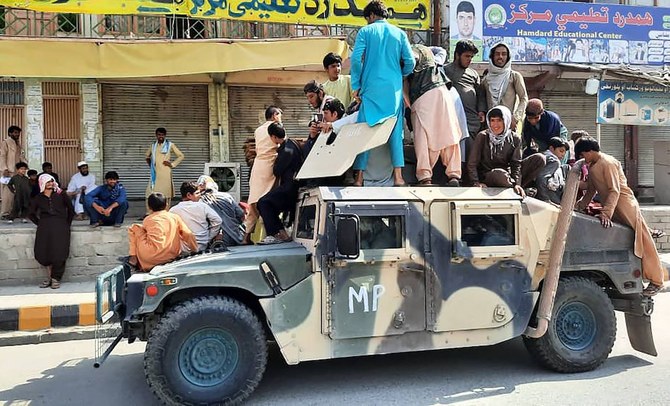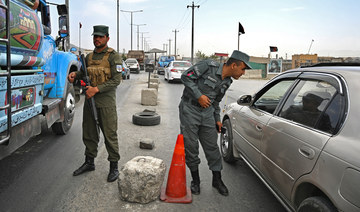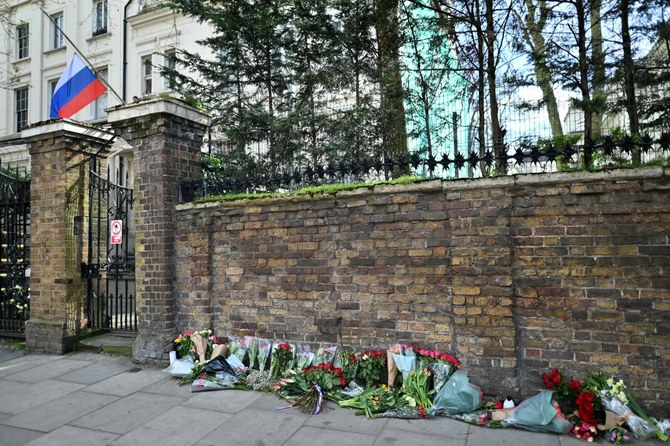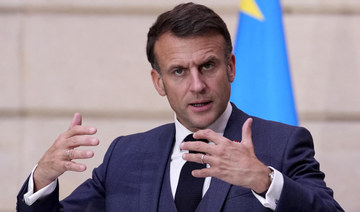DUBAI: The world is reacting to the rapid developments in Afghanistan after Taliban insurgents entered Kabul and President Ashraf Ghani left Afghanistan on Sunday, bringing the Islamist militants close to taking over the country.
US
US Secretary of State Antony Blinken says the US is evacuating remaining staff at the US Embassy in Kabul as the Taliban enter the Afghan capital. But he is playing down America’s hasty exit, saying “this is manifestly not Saigon.”
Speaking on ABC’s “This Week” on Sunday, Blinken said: “The compound itself, our folks are leaving there, and moving to the airport.”
Blinken also confirmed that US Embassy workers were destroying documents and other items ahead of fleeing the embassy, but insisted “this is being done in a very deliberate way, it’s being done in an orderly way, and it’s being done with American forces there to make sure we can do it in a safe way.”
The evacuation of the US Embassy in Kabul had US military helicopters lifting off from embassy grounds Sunday, and sent puffs of black smoke up into the skies over Kabul as US officials worked to keep sensitive material from falling in Taliban hands.
The scene comes after President Joe Biden earlier this year played down any idea that the Taliban could capture the country, or that the Afghanistan war would end up in scenes reminiscent of the Vietnam one, with military helicopters taking off from embassy rooftops.
Blinken defended Biden’s decision to end the nearly 20-year US military mission in Afghanistan, saying Biden’s hands were tied by a withdrawal deal President Donald Trump struck with the Taliban in 2020.
If Biden had called off the withdrawal, “we would have been back at the war with the Taliban,” and forced to surge tens of thousands of American forces back into Afghanistan, Blinken said.
UK
Nobody should bilaterally recognise the Taliban as the government of Afghanistan, British Prime Minister Boris Johnson said on Sunday, adding it was clear that there would be a new administration in the country very shortly.
"We don't want anybody bilaterally recognising the Taliban," Johnson said in an interview clip, urging the West to work together on Afghanistan through mechanisms such as the United Nations and NATO.
"We want a united position amongst all the like-minded as far as we can get one so that we do whatever we can to prevent Afghanistan lapsing back into being a breeding ground for terror."
UAE
The United Arab Emirates foreign ministry on Sunday said it was working on facilitating the evacuation of foreign diplomatic staff from Afghanistan through airports in the Gulf Arab state.
That included diplomatic staff from the United States, Britain, France, Germany, Canada, Egypt, Australia and the European Union it said in a statement.
The UAE is a major international air transit hub.
Russia
Russia’s state news agency reported Sunday that the Taliban promised to guarantee the safety of the Russian embassy in Kabul.
Tass quoted Suhail Shaheen, a spokesman for the Taliban’s political office, as saying that the organization has “good relations with Russia” and a “policy in general to ensure safe conditions for the functioning of the Russian and other embassies.”
The Kremlin's envoy on Afghanistan said Sunday that there are no plans to evacuate the Russian embassy in Kabul. Zamir Kabulov told the Interfax news agency that Russia’s ambassador and its staff are “calmly carrying out their duties.”
The reports came as Taliban fighters entered Kabul after a week-long blitz ahead of the final pullout of American and NATO troops. The Taliban said they don’t plan to take the capital city by force.
Germany
German media have issued an urgent appeal to Chancellor Angela Merkel and the country’s foreign minister for an emergency visa program to help local staff who worked for them to leave Afghanistan.
In an open letter Sunday, major German newspapers, public and commercial broadcasters, and the dpa news agency warned that “the lives of these freelance staff are now in acute danger.”
The media outlets stressed that reporting from Afghanistan over the past two decades would have been “unthinkable without the efforts and bravery of the Afghan staff who supported us on the ground: local journalists, stringers and translators.”
Citing several recent fatal attacks on journalists, the letter said that due to the advance of the Taliban “it must be feared that such murders will now dramatically increase - and many of our staff are at risk.”
“We are convinced: there is no time to lose now,” it adds. “Our staff who want to leave the country are at risk of persecution, arrest, torture and deaths. That is why we ask you act quickly.”
Italy
Italian media reported Sunday that most personnel at the Italian Embassy in Kabul are being transferred to the Afghan capital’s airport in preparation for evacuation.
The report Sunday by Corriere della Sera said the move affects some 50 Italian staffers and 30 Afghan employees and their families, along with Carabinieri paramilitary police protecting the embassy.
The Foreign Ministry confirmed that staff were being transferred to the airport, as other nations were in the process of doing, but could not give numbers or timing.
Italy’s defense minister has said that 228 Afghans and their families have already been transferred to Italy, calling it a “moral duty” to protect those who had worked with Italy and who would face reprisals by the Taliban.
The Italian agency LaPresse reported a flight carrying Italian embassy staff would depart Kabul Sunday evening.
Sweden
Sweden will evacuate all its embassy staff from Kabul on Sunday, public service broadcaster Swedish Radio reported, citing sources.
Vatican – Pope Francis
Pope Francis expressed his “concern” Sunday over the conflict in Afghanistan and called for dialogue so that the “battered population” can live in peace.
“I join in the unanimous concern for the situation in Afghanistan,” the pontiff said during the weekly Angelus at the Vatican.
“I ask all of you to pray with me to the God of peace so that the clamour of weapons might cease and solutions can be found at the table of dialogue.
“Only thus can the battered population of that country – men, women, elderly and children - return to their own homes, and live in peace and security, in total mutual respect.”
(with input from Reuters, Associated Press and AFP)
























